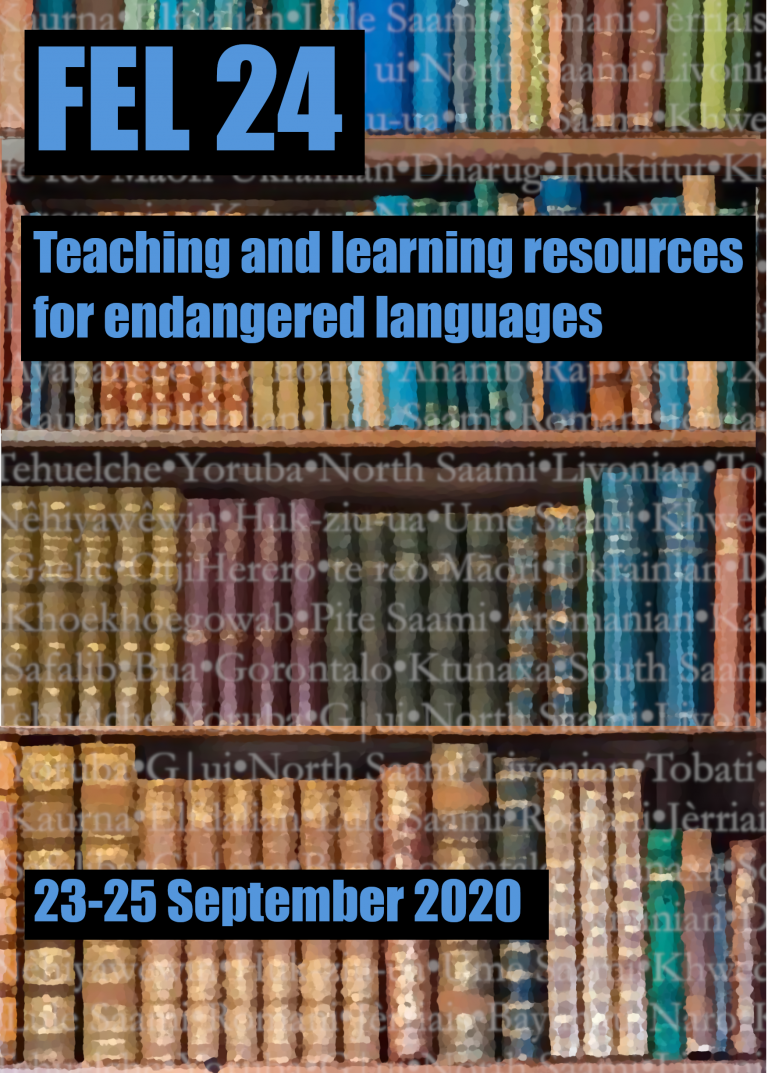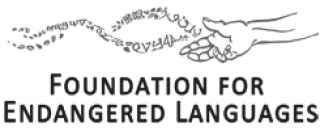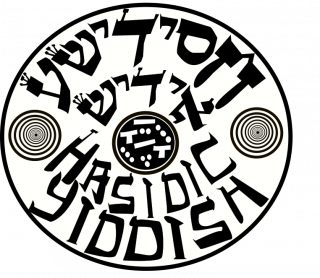ONLINE: Foundation for Endangered Languages Annual Conference: FEL24
23 September 2020–25 September 2020, 8:00 am–10:00 pm

Teaching and Learning Resources for Endangered Languages
This event is free.
Event Information
Open to
- All | UCL staff | UCL students | UCL alumni
Availability
- Yes
Cost
- Free
Organiser
-
Foundation for Endangered Languages
The theme of this year’s FEL conference is teaching and learning materials (including primers, grammars, dictionaries, textbooks, websites, language documentation and other audiovisual material, apps, etc.) for, in, and about endangered languages.

Conference recordings are now available on YouTube
This event is free. Please consider making a donation to FEL’s grant programme in lieu of a registration fee.
We have included presentations that focus on the types of pedagogical resources that are appropriate for endangered language situations (including the teaching and learning of speaking, listening, reading, and writing skills, as relevant), and the roles they can play in the support for and revitalisation of endangered languages. Presentations will also explore how such resources can contribute to the status and profile of a language, and what practical and pedagogical solutions and resources work best for first, heritage, and second language speakers and learners.
We will send information about the online conferencing tool and detailed instructions to registered participants in due time. In addition to the main presentations there will be virtual social and cultural events, break rooms, and a virtual reception room and test facility.
Keynote Speakers
- Bruno Estigarribia (UNC-Chapel Hill, USA) - Incomplete standardization: challenges and choices in grammar writing
- Timothy Currie Armstrong (Sabhal Mòr Ostaig, Isle of Skye, Scotland) - Not Enough Words: Language acquisition and identity work in tertiary-level Gaelic-medium education
- Sophie Nock (University of Waikato, New Zealand) - Textbooks for the teaching of te reo Māori: Time for change?
Programme
Download the full programme (PDF) or (Word), book of abstracts (PDF), and Keynote abstracts (PDF)
Wednesday 23 September
- Keynote address 1: Sophie Nock (University of Waikato) - Textbooks for the teaching of te reo Māori: time for change?
- Panel 1: Orthography and dictionaries, Chair: Peter Austin (SOAS University of London)
- Panel 2: Podcasts, Chair: Chris Moseley (UCL and FEL)
- Panel 3: Teachers in focus, Chair: Simo Muir (UCL)
- Panel 4: Teaching materials, Chair: Zoë Belk (UCL)
- Yiddish music concert with Polina Shepherd
- Panel 5: Covid-19 and endangered languages, Chair: Kriszta Eszter Szendrői (UCL)
- Panel 6: Apps and software, Chair: Riitta Valijarvi (UCL)
Thursday 24 September
- Panel 7: Children and schools, Chair: Cassie Smith-Christmas (National University of Ireland, Galway and FEL)
- Keynote address 2: Timothy Currie Armstrong (Sabhal Mòr Ostaig, Isle of Skye) - Not enough words: language acquisition and identity work in tertiary-level Gaelic-medium education
- Panel 8: Large-language contexts, Chair: Jelena Čalić (UCL)
- Panel 9: Teaching and learning resources for Romani in Central Europe – overcoming standardisation
- Panel 10: Language and tradition, Chair: Yair Sapir (Kristianstad University)
- Film viewing and discussion: What if Babel was just a myth?
- Panel 11: Incorporating traditional knowledge into pedagogy 1, Chair: Sonya Yampolskaya (UCL)
- Panel 12: Enrichment activities, Chair: Lily Kahn (UCL)
Friday 25 September
- Panel 13: Incorporating traditional knowledge into pedagogy 2, Chair: Sebastian Drude (Museu Paraense Emílio Goeldi and Goethe-University Frankfurt)
- Panel 14: Metaphors, idioms, and proverbs, Chair: Peter Austin (SOAS University of London)
- Panel 15: Writing and orthography, Chair: Kriszta Eszter Szendrői (UCL)
- Panel 16: Learning materials, Chair: Lily Kahn (UCL)
- Keynote address 3: Bruno Estigarribia (UNC-Chapel Hill) - Incomplete standardization: challenges and choices in grammar writing
- Panel 17: Pedagogical materials and new speakers, Chair: Rogier Blokland (Uppsala University)
- Panel 18: Primary education, Chair: Riitta Valijarvi
Download the full programme (PDF) or (Word) and book of abstracts (PDF)
Concert
The first evening of the conference will include September Lid a concert of Yiddish music by renowned performer Polina Shepherd.
Polina Shepherd was born in Siberia and grew up in a home where songs were often sung at the family table. When she was a young child, her family moved to Tatarstan, where she found herself drawn to the specific Islamic ornamentation and timbre of the area. This is still present in her unique vocal style. Now a globally renowned performer, composer, choir leader and cultural activist, she brings the songs of the Steppes and the Shtetl bang up to date with passion and haunting soul. Her latest projects are about bringing the world together. Polina will bring us a selection of her latest compositions. Come and enjoy a unique performance, full of beautiful, inspiring song.
Film
What if Babel was just a Myth?
Feature documentary, color, 56 minutes, June 2019
A Film by Sandrine Loncke (Ethnomusicologist, Paris 8 University), with Florian Lionnet (Linguist, Princeton University).
With English subtitles and voice-over.
Languages of the film: French, Chadian Arabic, Láàl, Bua, Bagirmi, Secret initiation Language.
Trailer
Synopsis
According to the UN, one language dies every two weeks. Young linguist Florian Lionnet is documenting Láàl, an indigenous language isolate of southern Chad in danger of disappearing. People in this part of the world speak between five and seven languages. The film goes out to meet villagers and explore their relation to their multiple languages. With their testimonies, one discovers a deeply multilingual humanity, made up of a myriad societies, each endlessly using language to encode its knowledge, its culture, and much more: its entire worldview. Could it be that multilingualism is the “natural” state of humanity? And for how much longer?
Director’s statement
As Europeans, we come from highly centralized political systems which have for the most part enforced linguistic unification within their borders. Spontaneously, we see linguistic diversity as an obstacle to inter-understanding.
A contrario, the film, which follows a young linguist studying a small endangered language of southern-Chad, shows that giving up one's language to adopt that of the majority is hardly a natural human tendency. In the absence of political constraint, it seems that every society prefers to keep its linguistic particularities, even if it means having to learn the six or seven languages of its neighbors!
It is certainly by virtue of this tendency that such a linguistic diversity has been able to develop through millennia on our planet.
Through the example of a small African village, "What if Babel was just a Myth?" is thus an advocacy for cultural diversity.
At a time when the loss of biodiversity has become a major concern, have we properly measured the role played by small indigenous societies in preserving their ecosystems?
Conference organisers
- Lily Kahn, UCL
- Riitta-Liisa Valijärvi, UCL and Uppsala University
Scientific committee
- Peter Austin, SOAS, University of London, and FEL
- Zoë Belk, UCL
- Rogier Blokland, Uppsala University
- Christopher Moseley, UCL and FEL
- Aaron Rubin, Penn State University
- Cassie Smith-Christmas, National University of Ireland, Galway and FEL
- Kriszta Eszter Szendrői, UCL
- Sonya Yampolskaya, UCL
The conference has been generously supported by the AHRC-funded UCL research project Contemporary Hasidic Yiddish.

Small Languages Rock!
Small languages rock! is a nonprofit music and language project aiming at supporting small languages through pop music, by sharing and inspiring. The project shares music and backtracks (playbacks) free of charge with its partners. For more information check Small Languages Rock on Facebook or contact Yair Sapir through yairosapiro@gmail.com.
 Close
Close

